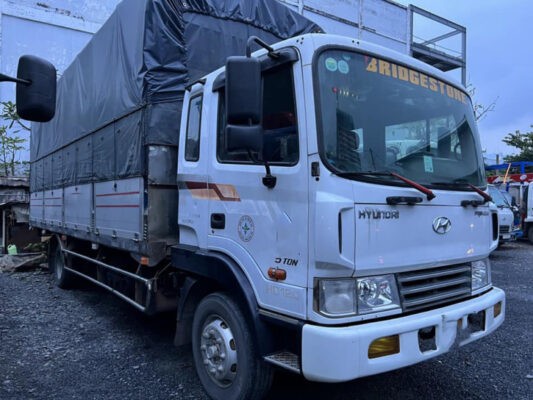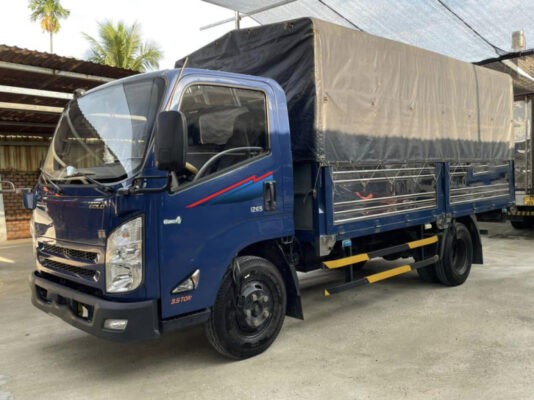Are you researching 5-ton truck bed sizes? Do you need to know which 5-ton truck bed dimensions are best for your cargo needs? Let My Dinh Truck, your leading truck expert, guide you through everything you need to know about 5-ton truck bed sizes to make the optimal choice for your business.
5-Ton Truck Classifications and the Importance of Bed Size
In the Vietnamese transportation market, 5-ton trucks play a crucial role in freight forwarding, especially in urban and inter-provincial areas. 5-ton trucks are classified based on several criteria, with the truck bed style being a key factor directly impacting the type of goods transported and economic efficiency.
Common 5-ton truck bed types include:
- Flatbed: Suitable for construction materials and bulky, weather-resistant goods.
- Enclosed/Box Body: Protects goods from environmental factors, ideal for electronics, furniture, and dry food.
- Tarpaulin/Covered Body: Versatile, can carry a variety of goods, easy to load and unload, suitable for agricultural products and consumer goods.
- Refrigerated Body: Specifically designed for goods requiring low-temperature preservation, such as fresh food and pharmaceuticals.
 A 5-ton box truck carrying various goods
A 5-ton box truck carrying various goods
5-ton truck bed size not only determines the volume of goods that can be transported but also affects maneuverability on roads, especially in urban areas. Choosing the right bed size helps businesses optimize transportation costs, ensure cargo safety, and comply with weight regulations.
Standard 5-Ton Truck Bed Dimensions and Influencing Factors
5-ton truck bed sizes are not fixed and vary depending on the manufacturer, truck model, and intended use. However, there are common standard dimensions widely trusted by transportation businesses.
Common 5-ton truck bed dimensions (Length x Width x Height):
- Length: 6.2 meters (approximately 20.3 feet)
- Width: 2.2 meters (approximately 7.2 feet)
- Height: 2.5 meters (approximately 8.2 feet)
Standard 5-ton truck bed volume: Approximately 34 cubic meters (approximately 1200 cubic feet).
Note: These are reference dimensions; actual sizes may vary depending on the specific truck model. For the most accurate information, consult the technical specifications from the manufacturer or truck dealer.
Factors influencing 5-ton truck bed size:
- Type of truck bed: Enclosed bodies typically have different dimensions than tarpaulin-covered or flatbeds.
- Vehicle wheelbase: Trucks with different wheelbases will have different bed sizes.
- Manufacturer’s regulations: Each manufacturer may have its own design standards for truck bed sizes.
- Special transportation requirements: For certain specialized goods, truck beds may be custom-designed to meet specific size and carrying capacity requirements.
Choosing the Right 5-Ton Truck Bed Size: Expert Guidance
Selecting the appropriate 5-ton truck bed size is crucial for optimizing transportation efficiency and saving costs for businesses. Here are important factors to consider:
-
Type of goods transported:
- Light, bulky goods (like foam, cotton): Prioritize truck beds with large volume.
- Heavy, small goods (like steel, machinery): Focus on permissible payload and bed durability.
- Loose goods (like sand, gravel, agricultural products): Flatbeds or dump trucks are optimal choices.
- Goods requiring preservation (like food, pharmaceuticals): Enclosed or refrigerated bodies are mandatory.
-
Average shipment volume and size: Calculate the average size and volume of goods per trip to choose a truck bed with appropriate volume and payload, avoiding wasted space or overloading.
-
Transportation routes:
- Inner-city, narrow roads: Choose trucks with moderate bed sizes for easy maneuverability and turning.
- Highways, long distances: Longer truck beds can optimize transportation efficiency over long distances.
-
Regulations on weight and vehicle size: Understand legal regulations regarding weight and vehicle size to choose a suitable truck bed, avoiding violations and penalties.
-
Investment budget: The cost of 5-ton trucks and truck beds varies depending on size and type. Consider your budget to choose a vehicle configuration that fits your financial capabilities.
 A versatile 5-ton truck with a tarpaulin-covered bed for flexible transport
A versatile 5-ton truck with a tarpaulin-covered bed for flexible transport
Advice from My Dinh Truck: If you are still unsure about choosing the right 5-ton truck bed size, please contact our team of experts. We will provide dedicated advice to help you choose a 5-ton truck with the optimal bed size for your business’s transportation needs.
Pros and Cons of 5-Ton Trucks and Bed Sizes
Advantages of 5-ton trucks:
- Suitable payload: 5 tons is an ideal payload for many types of goods and transportation businesses.
- Flexible size: 5-ton trucks are not too large, making them easy to maneuver in cities and on smaller roads.
- Variety of models and bed types: The market offers many 5-ton truck models from various brands, with diverse bed styles to meet all needs.
- Reasonable investment and operating costs: Compared to larger trucks, 5-ton trucks have more economical investment and operating costs.
Disadvantages of 5-ton trucks:
- Payload limitations: Not suitable for transporting oversized or overweight goods.
- Limited bed size: Compared to larger trucks, 5-ton truck bed sizes may be limited for some bulky or large-quantity goods.
- Operational capability on complex terrain: 5-ton trucks may face difficulties operating on very rough or mountainous terrain.
Conclusion
5-ton truck bed size is a crucial factor to consider carefully when choosing a truck for your transportation business. Understanding truck bed types, standard dimensions, influencing factors, and how to choose the right bed will help businesses optimize transportation efficiency, save costs, and enhance competitiveness.
My Dinh Truck hopes this article has provided you with useful information about 5-ton truck bed sizes. If you need more in-depth consultation or want to learn about quality 5-ton truck models, please contact us immediately. The expert team at My Dinh Truck is always ready to assist you!